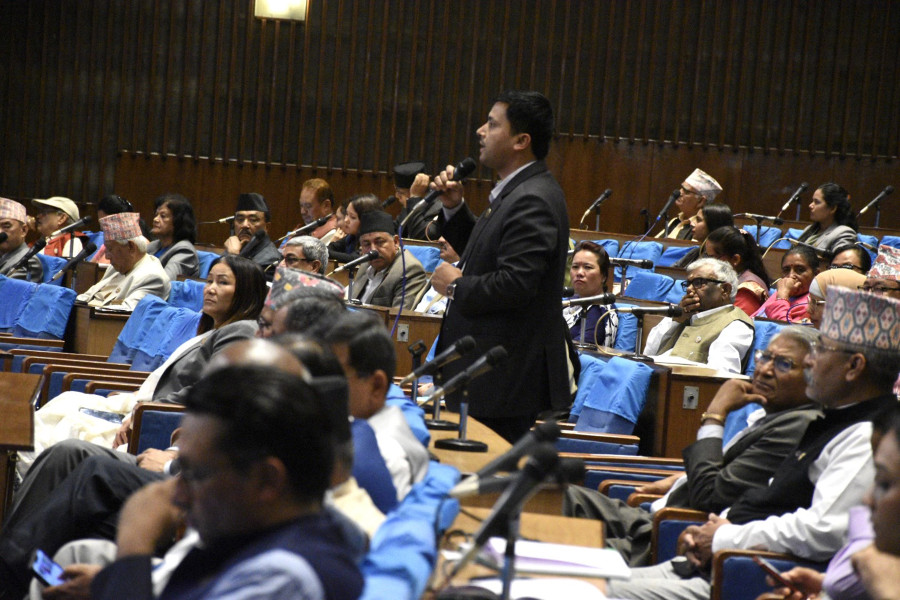National
Parliament staff protest for perks stalls budget passage
The protest over overtime allowances has hit both parliamentary proceedings and committees. Law minister says issue will be resolved through talks today
Post Report
The plan to endorse the national budget from the House of Representatives failed on Sunday due to ongoing protest by Parliament staff demanding overtime allowances.
After a cross-party agreement in the Business Advisory Committee meeting, the Parliament Secretariat had planned to present the Appropriation Bill for endorsement on Sunday. However, it couldn’t be tabled as the Parliament employees refused to work extra hours.
Starting last week, the employees in the Parliament have been refusing to work overtime, directly affecting budget deliberations. Despite efforts by the lower house Speaker and the chairperson of the National Assembly, the issue could not be resolved as the government was reluctant to pay the staffers for extra work. They had lobbied Prime Minister Pushpa Kamal Dahal and Finance Minister Barsha Man Pun both jointly and individually to release the allowance, but to no avail.
With no sign of the employees giving up their protest, the government on Sunday formed a three-member committee led by Padam Giri, minister for law, justice, and parliament. Padma Prasad Pandey, general secretary at the Parliament Secretariat, and Finance Secretary Madhu Marasini are members of the panel.
Talking to the journalists, Giri said they would resolve the issue by Monday. “We are serious about the protest. The matter will be resolved by Monday through dialogue,” he said. The protesting employees insist that they will not end their protest until the government makes a written commitment about the allowance.
“We will not work more than seven hours a day. We worked until 7:30 pm on Sunday because we had started at 12:30 pm,” Govinda Belbase, chairperson of the Employee Union of the Federal Parliament Secretariat, told the Post. “The staff cannot take the blame for failure in endorsing the budget as scheduled. We have fully worked within our duty hours."
Belbase claimed that they had drawn the attention of the Speaker and senior officials about their issues even before the formulation of the budget. Speaker Devraj Ghimire had requested Pun to address the issue through the budget.
However, the money was not allocated in the national budget presented in Parliament on May 28, prompting the protest.
Lawmakers from different parties have expressed support for the protesting staff. Speaking in the lower house on Sunday they asked the government to address the demand immediately. "It is unjust to deny overtime allowances. I demand the government act on their demands immediately," said Roshan Karki, a Rastriya Prajatantra Party lawmaker. Nepali Congress lawmaker Ajay Chaurasiya echoed.
The protest has not just affected the parliamentary proceedings but also has halted the work of parliamentary committees.
On normal days, meetings of parliamentary committees were held in the morning, while parliamentary meetings were conducted after 11 am. But wth the parliament staff stopping work in the morning, no committee meetings have been held for days.
Parliament Secretariat staff claim that they have to work regularly before and after office hours without extra pay, while lawmakers get travel and meeting allowances in addition to their salaries for attending House and parliamentary committee meetings.
Belbase said it has been three years since the government stopped paying the allowance.
Belbase said that the House meetings, which generally start at 11 am, often run past 5 pm. Staff must arrive at least an hour early for preparations and stay an additional hour after the meeting.
Protestors say they had been working over 10 hours a day for months without extra payment.
This is unjust and goes against the ILO Convention 1930, to which Nepal is a party, the protestors say. Article 3 of the Convention states, “The hours of work of persons to whom this Convention applies shall not exceed forty-eight hours in the week and eight hours in the day, except as hereinafter otherwise provided.”
The allowance for government staff was withdrawn following the Covid pandemic. The government resumed the allowance in some state agencies, including the Election Commission and the Commission for the Investigation of Abuse of Authority, but Parliament staff have been excluded, according to the protestors.




 14.12°C Kathmandu
14.12°C Kathmandu













